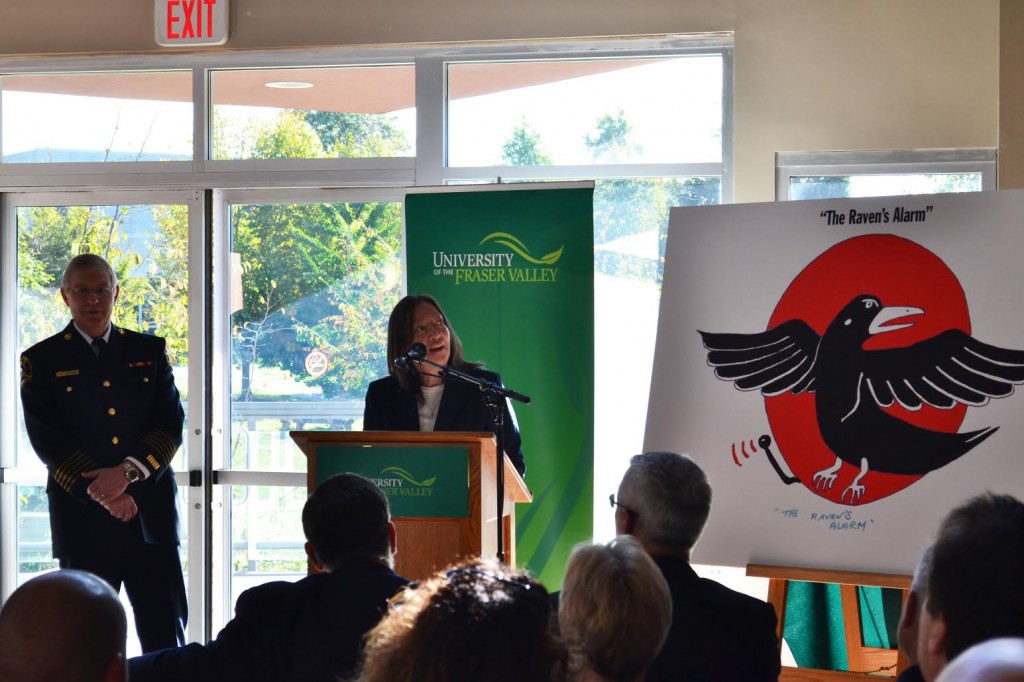By Valerie Franklin (The Cascade) – Email
Print Edition: October 8, 2014

Thanks to a donation from fire prevention company Kidde Canada, First Nations homes across BC will soon be equipped with smoke alarms.
First Nations elders, government officials, and university administrators filled UFV’s Alumni Hall Friday, October 3 for the announcement of a unique fire safety campaign “by First Nations, for First Nations,” kicking off Fire Prevention Week.
Surrey Fire Chief Len Garis announced that Kidde Canada has donated $100,000 worth of smoke detectors to First Nations communities across BC. The donation follows several studies indicating that First Nations people are among the most at-risk people in Canada for house fires.
“Recent studies show that First Nations communities have a 2.5 to 2.8 times greater risk of dying [in a fire] than the rest of the Canadian population, and we need to do something about them,” said Garis.
He explained that in 2008, UFV conducted research for the City of Surrey and found that nearly 70 per cent of Surrey fires over the last 20 years started in buildings that did not have a working smoke alarm. The research predicted that if those homes were equipped with smoke detectors, the rate of death could be reduced by as much as 32 per cent. Garis noted that only half of the homes on First Nations reserves had a working smoke alarm at that time.
This research sparked a fire prevention movement in BC. On March 12, the provincial government partnered with the BC Fire Chiefs Association to launch a campaign to ensure that every home in BC was equipped with a working smoke alarm — particularly for First Nations people and elderly citizens, who, Garis says, are among “the most vulnerable segments of the population.” At that time, Kidde Canada donated 5,000 smoke alarms at a value of $75,000, and Aboriginal Affairs and Northern Development Canada purchased 2,500 more.
Garis reported that due to the “overwhelming response” from First Nations communities throughout BC, the number of smoke alarms grew to a total of 16,137, to be installed in 9,321 First Nations homes across 114 communities. With Kidde Canada’s most recent donation of 2,500 smoke alarms, the total amounts to over 18,000.
Garis pointed out that it’s common for people to take their smoke alarms down because they can cause annoying false alarms when they’re cooking. He emphasized that smoke alarms should never be removed or disabled, and that they must be diligently replaced every 10 years.
“Functioning smoke alarms can improve response times to fires, and fire safety devices can play a crucial role in preventing deaths and injuries when victims are asleep or distracted,” he said.
The smoke alarm campaign’s logo is a painting titled “The Raven’s Alarm” by Steven Point, a provincial court judge and former lieutenant governor of BC. The original work was unveiled by his wife, Gwen Point, at the ceremony.
Gwen Point is an assistant professor of social work and human services at UFV, but also a First Nations mother and grandmother. She and her husband were involved in the inception of this campaign, and she discussed the positive impact of Kidde Canada’s donation on impoverished communities.
“Many [First Nations] families cannot afford to buy a smoke alarm,” she said. “Are you going to buy a smoke alarm, or are you going to buy food?”
She also admired the collaboration between associations, companies, and communities that it took to create this initiative.
“No one person can do something like this alone,” she noted. “It takes an effort from all levels, from the top down and across the agencies.”
Other First Nations speakers included Grand Chief Stewart Phillip, president of the Union of BC Indian Chiefs, and Edwin Mountain, president of the First Nations Emergency Services Society, both lauding the initiative. Eddie Gardner (T´ít´elem Spath), a member of the Skwah First Nation and one of UFV’s elders-in-residence, also gave a welcoming statement and blessed the ceremony with a song, recognizing the importance of distributing fire prevention materials to First Nations communities throughout BC.
“It’s all about safeguarding life, and it’s all about recognizing that life is sacred,” he said.


